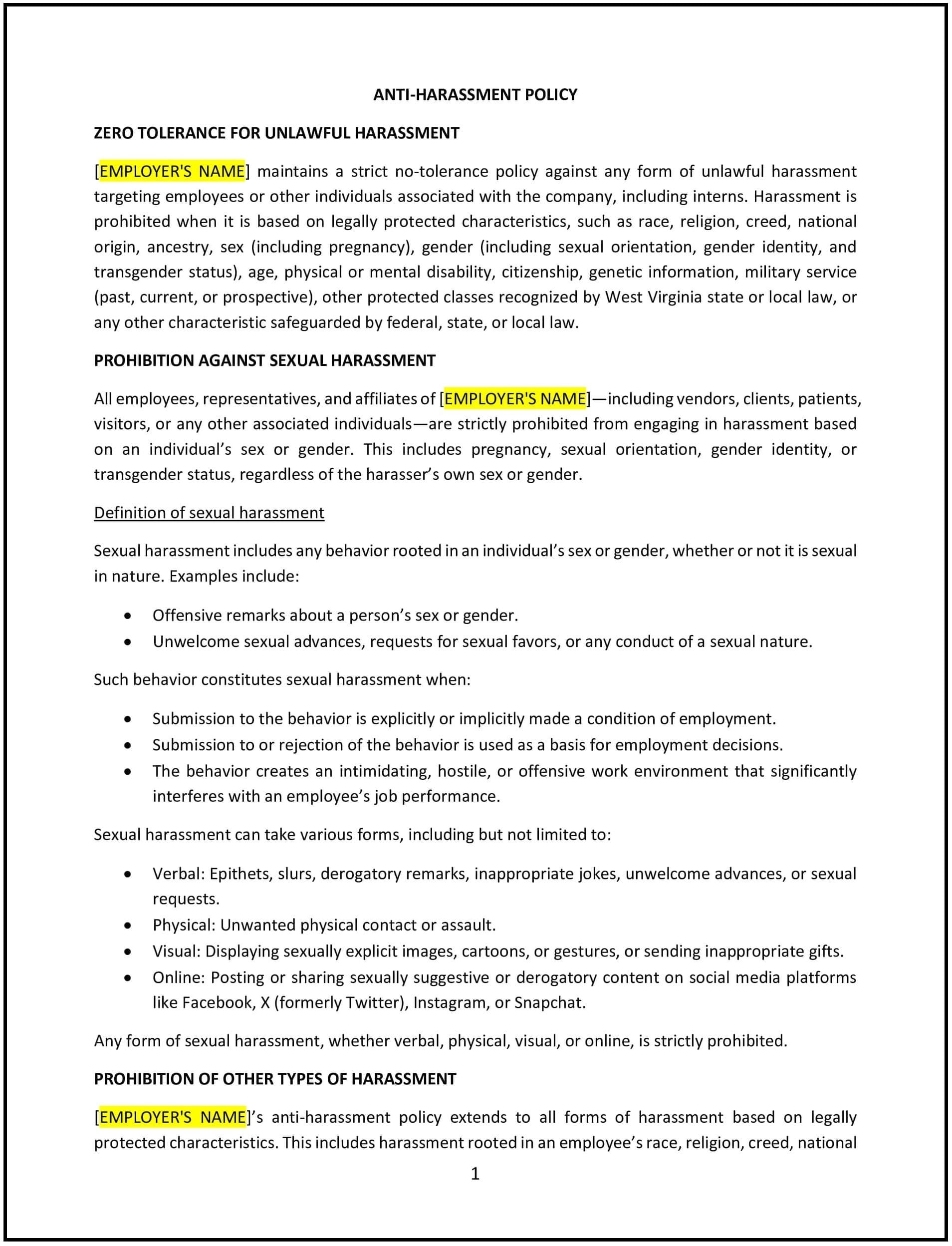Anti-harassment policy (West Virginia): Free template
Got contracts to review? While you're here for policies, let Cobrief make contract review effortless—start your free review now.

Customize this template for free
Anti-harassment policy (West Virginia)
An anti-harassment policy helps West Virginia businesses create a safe, respectful, and inclusive workplace by preventing harassment based on race, gender, sexual orientation, disability, religion, or any other protected category. This policy defines unacceptable behaviors, outlines procedures for reporting harassment, and establishes a clear response protocol to address complaints promptly and fairly.
By implementing this policy, businesses can foster a positive work environment, promote compliance with state and federal anti-discrimination laws, and protect employees from harassment.
How to use this anti-harassment policy (West Virginia)
- Define harassment: Clearly define harassment, including physical, verbal, and visual harassment, and specify the types of conduct that are prohibited, such as offensive jokes, inappropriate comments, physical intimidation, or other forms of misconduct.
- Specify protected categories: Outline the categories of protected employees, including those protected under federal law (e.g., race, gender, age, disability) and any additional categories protected by West Virginia state law.
- Establish reporting procedures: Provide a clear process for employees to report harassment, including who to contact (HR, management, or a third-party hotline), and ensure confidentiality and protection against retaliation.
- Ensure timely investigation: Define how complaints will be investigated, including timelines for addressing complaints, the investigation process, and who will conduct the investigation.
- Provide remedies: Outline the potential outcomes for those found guilty of harassment, which may include disciplinary actions, training, counseling, or termination of employment, depending on the severity of the offense.
- Protect against retaliation: Specify that no employee will face retaliation for reporting harassment or participating in investigations, and outline the consequences for any retaliatory behavior.
- Provide training: Offer regular training to employees and management on recognizing harassment, understanding the policy, and preventing misconduct in the workplace.
Benefits of using this anti-harassment policy (West Virginia)
This policy offers several benefits for West Virginia businesses:
- Supports compliance: Helps businesses comply with both state and federal anti-discrimination laws, such as Title VII of the Civil Rights Act and the West Virginia Human Rights Act.
- Fosters a respectful work environment: Encourages respectful, inclusive behavior by setting clear standards for what constitutes harassment and how it will be addressed.
- Protects employees: Provides employees with a safe, supportive environment where they can work free from harassment and fear of retaliation.
- Reduces legal risks: By taking proactive steps to prevent and address harassment, businesses reduce the risk of legal claims and costly litigation.
- Enhances employee morale: Employees who feel respected and protected from harassment are more likely to be engaged, productive, and loyal to the company.
Tips for using this anti-harassment policy (West Virginia)
- Communicate the policy clearly: Ensure that all employees are aware of the anti-harassment policy, understand what constitutes harassment, and know how to report incidents.
- Provide accessible reporting channels: Offer multiple reporting channels, including anonymous options, to ensure that all employees feel comfortable coming forward.
- Investigate complaints promptly: Ensure that all harassment complaints are investigated in a timely, thorough, and impartial manner to resolve issues swiftly.
- Offer training: Regularly train employees and managers to help them understand and prevent harassment in the workplace.
- Review and update regularly: Periodically review the policy to ensure it aligns with any changes in West Virginia laws, federal regulations, or company practices.